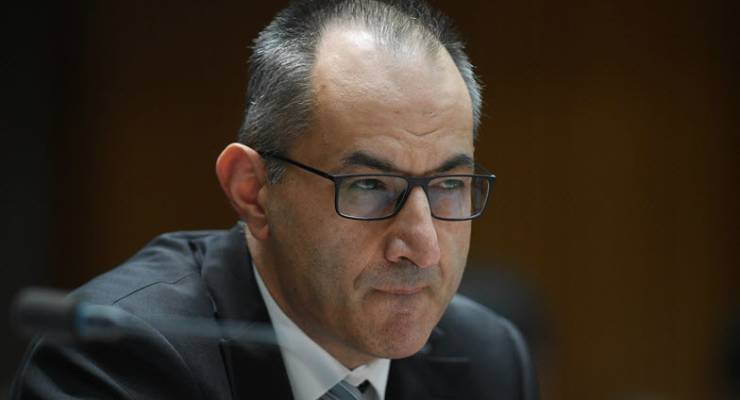
Secretary of the Department of Immigration Mike Pezzullo
The Australian National Audit Office (ANAO), from its location in Canberra’s Centenary House,* just around the corner from DFAT in Barton, produces about one performance audit a week — week in and week out — throughout the year. The relevant agencies, and their respective minister, get a heads-up and a copy a few days before, then they’re tabled in Parliament, and out they go.
Most audit reports, because they identify minor process problems, don’t attract any wider attention. Occasionally — though rarely — the ANAO gives some lucky agency a big tick for the way it has handled a program or implemented a policy, although the ultimate endorsement “demonstrated aspects of best practice” is very rarely bestowed.
And, occasionally, audits go off like bombs within the public service, or even politically. If that happens, there’s no court of higher appeal. Frustrated secretaries can only insist — like Immigration’s Mike Pezzullo did earlier this year, when the ANAO revealed the remarkable levels of incompetence within his department in relation to both the procurement and management of offshore processing contracts — that they “disagree with the ANAO’s conclusions”. But the ANAO has a hard-earned reputation for thoroughness and diligence that elevates any such debate above any attempts to dispute their findings.
The process behind a performance audit provides a sound basis for that. The office this year put out a draft program for MPs and agencies to comment on. Possible audits are rigorously scoped out, a process that costs up to $20,000, before a business case is put to the Auditor-General, Grant Hehir, for consideration, at which point some proposed audits get knocked back. The audits themselves can cost between $300,000-500,000, although the offshore-processing contract management audit involved travel to PNG and Nauru and cost $1.5 million.
Since 2015, Hehir has changed the ANAO’s previous staffing approach, when its staff stayed in specific portfolio areas and then moved onto a new audit in the same area as each one was completed. Teams are now more generalist, and take up scheduled audits as they arise, regardless of which portfolio they are in. And the office is now bringing in external consultants with economic expertise to enable the ANAO to more fully fulfil its remit.
Another recent shift has been a more aggressive approach from the Joint Committee of Public Accounts and Audit, the parliamentary committee to which the ANAO reports, chaired by Western Australian Liberal Senator Dean Smith. Embarrassed public servants get short shrift from Smith. He arkked up in March at an inquiry into the ANAO’s audits of the Commonwealth’s funding of the East-West Link in Melbourne and WestConnex in Sydney, which were damning of the Abbott government, when staff from the Infrastructure Department started off their appearance by saying they hadn’t been around at the time. And the committee has grown tired of the ANAO making the same damning findings about public service failings, year in and year out, without apparent action, which makes a mockery of the public service’s professed commitment to “continuous improvement”.
The committee is now asking the ANAO to undertake audits into whether departments have carried out recommendations they agreed to in previous audits. A follow-up audit on cybersecurity tabled earlier this year caught out the Department of Immigration and the ATO, which had promised the committee in 2014 it would improve its cybersecurity resilience; now the committee itself is undertaking its own follow-up inquiry into the follow-up report, where Smith — constructively and politely — went after the ATO and Immigration for their continuing failure to improve.
The committee is also undertaking an inquiry into three of the most damning of recent audits on procurement — the two offshore processing contract audits, and Airservices Australia’s OneSKY tender debacle. Procurement (along with poor record-keeping) is the worst area for endless repetition of the same mistakes by departments. Defence has been the subject of repeated critical audits on procurement, but at least has a large and experienced procurement arm that has to engage in highly complex contracts for the provision of cutting-edge hardware. Many more mistakes come from agencies that lack experience in large-scale procurement, which try to do procurement too quickly or try to devise their own, overly complex approaches — and they’re often dealing with highly experienced private sector companies that can spot an inexperienced bureaucrat a mile off.
Whether the politicians and auditors, together, can shift the elephant of bureaucratic inertia remains to be seen.
*For younger readers, there’s a whole history to that location, involving not one but two royal commissions.








Crikey is committed to hosting lively discussions. Help us keep the conversation useful, interesting and welcoming. We aim to publish comments quickly in the interest of promoting robust conversation, but we’re a small team and we deploy filters to protect against legal risk. Occasionally your comment may be held up while we review, but we’re working as fast as we can to keep the conversation rolling.
The Crikey comment section is members-only content. Please subscribe to leave a comment.
The Crikey comment section is members-only content. Please login to leave a comment.